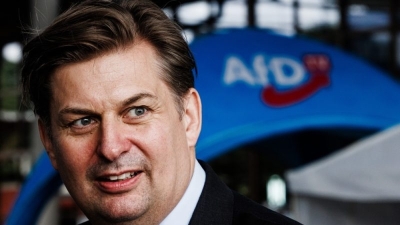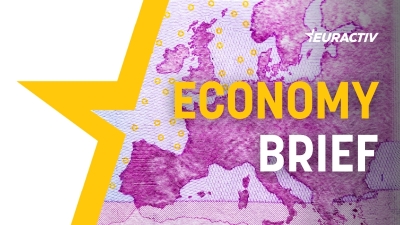The Brief – EU industry: Uncompetitive by design?

As we approach the European elections, competitiveness is the talk of the hour. And yet, with industrial competitiveness taking centre stage in economic policy debates, it is worth keeping in mind that rising carbon prices will make some industries even less competitive in the future – by design.
After the EU policy agenda has been dominated in the last five years by the Green Deal – the bloc’s comprehensive climate and environmental agenda – many hope for this to be followed up by an “Industrial Deal” or “Economic Deal” with the ambition of restoring more favourable conditions for industries.
The impact of climate policy on European industries has, in fact, only just begun.
One of the key mechanisms on which the EU’s climate policy is based is its emissions trading system (ETS), which became operational in 2005 and is based on targeted quotas of emission “allowances” allocated to each industry according to, among others, their carbon intensity.
The premise of the EU ETS is that, if you want to emit CO2 beyond those quotas, you should pay for it, while the number of free emission “allowances” decreases over time as they get phased out by 2034.
The total number of allowances – including these that companies need to pay for – also decreases in line with the EU’s climate targets of reducing net emissions by at least 55% by 2030 compared to 1990 levels and becoming climate neutral by 2050.
At the moment, prices for emission certificates are low – at around €59 as of Friday (22 March).
But given the EU’s high aspirations, Yann Andreassen, lead analyst on carbon markets at commodities specialist ICIS, said prices of €100 to €150 per tonne of CO2 can be expected by 2030.
In light of the Commission’s proposal of a new interim 2040 target of a 90% cut in emissions – in 2040, they could reach levels as high as €400 per tonne of CO2, according to analysis by the London Stock Exchange Group.
Meanwhile, many industries currently shielded from higher carbon prices through the free allocation of allowances will be increasingly exposed to market prices.
While the Carbon Border Adjustment Mechanism (CBAM) – a measure being phased in between 2023 and 2026 and meant to function as a compensation mechanism for foreign imports’ lower carbon costs – will ensure a level playing field with international competitors (though only within the EU market), European exporters will not benefit from it.
In particular, it will deal a further blow to the bloc’s industrial powerhouse Germany, which relies on exports more than other European countries.
Moreover, the number of businesses and consumers affected by carbon prices will increase dramatically in 2027 as the EU introduces a second emissions-trading system (ETS2), mainly aimed at oil and gas used in cars and trucks, heating systems, and small-scale industrial sites.
Rising carbon prices resulting from these concurring factors will add to energy prices that are already higher in Europe than elsewhere, BusinessEurope’s director Markus Beyrer pointed out this week, warning that the impact of the ETS on prices is “sometimes trivialised a little”.
In other words: While the desire to restore competitiveness is louder than ever, sceptics point out that Europe’s core climate policy will make things worse, at least for carbon-intensive producers.
This comes by design because rising prices for carbon-intensive products are the main lever to drive private investments in more climate-friendly alternatives.
And, given the EU’s self-imposed strict limits on public investment through higher public debt, as well as its resistance to tax increases, private investments and market-based strategies are what Europe currently relies on.
This poses a dilemma, particularly for Europe’s largest party, the centre-right EPP.
In fact, the party is simultaneously the one that championed putting carbon pricing at the heart of climate policy – it led last year’s reform of the bloc’s carbon market – and the one that spearheads promises to restore competitiveness in the next legislative term.
Asked about the issue in Berlin last week, the EPP’s lead candidate Ursula von der Leyen pointed to the success of emissions trading so far in reducing emissions while allowing for increased economic output.
Meanwhile, Friedrich Merz, leader of Germany’s conservative CDU (EPP), rejected the idea that rising carbon prices could further undermine competitiveness, instead arguing that “we see it as an opportunity to develop competitive products based on climate neutrality”.
This point was echoed by Andreassen, who highlighted that “a higher carbon price will be critical in order for Europe as a whole to be able to compete with other key countries such as China and the US on emerging green markets such as renewable technologies and electric vehicles”.
But when push comes to shove, and pressure mounts from affected industries – especially those that fail to invest in climate-friendly alternatives in time – will the EPP defend the core of EU climate policy?
Andreassen conceded that “there will be winners and losers when it comes to traditional European industry”.
“There will be differences in terms of the capacity of EU players to adapt to a higher carbon price in the coming years,” he said, “depending on sectors’ current competitiveness, companies’ strategies, and funding access.”
“At the end of today, there is a balance to be found,” Andreassen concluded, “between protecting historical European industry – through, for example, the CBAM – and creating a strong enough carbon price signal to decarbonise the European economy and ensure a high degree of competitiveness for new markets”.
This seems to be one of the key policy questions to watch during the election campaigns, and in the next legislature.
The Roundup
Ireland, Malta, Slovenia, and Spain said on Friday they are ready to recognise the state of Palestine as the “only way to achieve peace and security” in the war-ridden region.
Former Catalan president Carles Puigdemont announced on Thursday evening that he will run as head of his separatist party, Together for Catalonia (JxCat), in a snap election, to be held in Catalonia on 12 May.
After numerous delays, the planned legalisation of cannabis consumption in Germany has passed its last major obstacle – the Bundesrat (Federal Council) – however further resistance at the local level is anticipated.
Romania is seeking to deploy ‘small modular reactor’ (SMR) technology as part of its drive to reduce greenhouse gas emissions and its energy minister Sebastian Burduja said this week that a final investment decision will be taken in 2025 for a new nuclear power plant in Doicești.
Last week the European Commission published its latest list of infringement proceedings against member states – and most of the alleged failures to implement EU environmental law concern the bloc’s biodiversity rules.
Simon Harris, set to become Ireland’s youngest-ever prime minister, will hope his social media skills and fresh face can save his party’s flagging fortunes as elections loom.
For more policy news, check out this week’s Agrifood Brief, Economy Brief, and Tech Brief.
Look out for…
- Informal meeting of fisheries ministers on Sunday-Monday.
- Environment Council on Monday.
- Commissioner Janusz Wojciechowski receives representatives of Romanian Farmers’ Club on Monday.



